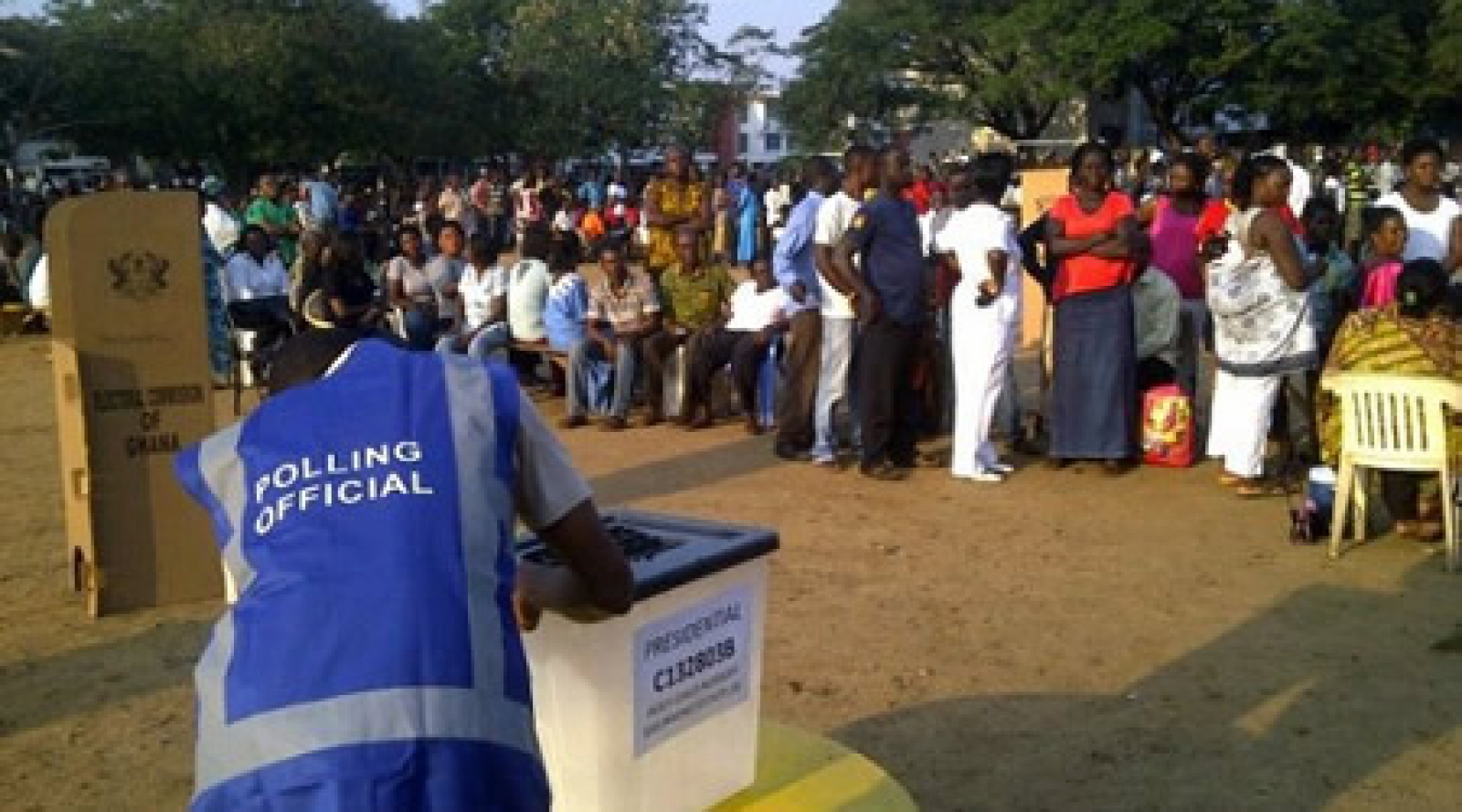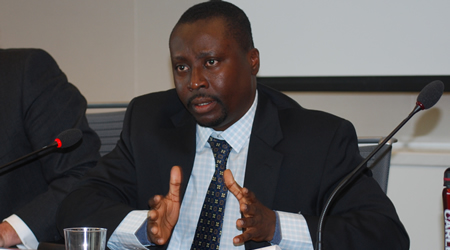
SHARE
Millions of Ghanaians voted in a close election last December that returned incumbent President John Dramani to office by a margin of less than 3 percentage points. An independent vote count by a local election monitoring organization that used SMS technology to verify returns from around the country gave many voters the confidence necessary to ensure a peaceful election process—both during the voting and in the days following.
The independent vote count, known as a parallel vote tabulation (PVT), was carried out by Ghana’s Coalition for Domestic Election Observers (CODEO) and the Ghana Center for Democratic Development (CDD-Ghana) , the country’s largest independent, nonpartisan domestic observation coalition, which has been monitoring elections since 2000.
In a recent visit to Washington, D.C., Franklin Oduro, deputy director for CDD-Ghana, participated in a discussion about the operation of the PVT, which was carried out with NDI’s help. CODEO deployed observers to 3,999 polling stations across the country for the December polls, which also included parliamentary contests. The observers collected information about election day conduct and vote tallies that was transmitted to a central location by text message. The information provided an independent verification of the presidential results as reported by Ghana’s Election Commission.
At a Jan. 10 discussion hosted by NDI, Oduro joined Richard Klein, NDI senior adviser for elections and political processes, and Chris Doten, NDI program manager for information and communication technology. The moderator was NDI’s regional director for Central and West Africa, Christopher Fomunyoh.
The 2012 election wasn’t the first time CODEO provided independent verification of results in a close race. The 2008 presidential election was won by a margin of less than 50,000 votes.
“CODEO’s PVT gave incredible confidence to citizens in a close election,” said Klein of the 2008 polls.
That election set the stage for 2012, when CODEO built on its past successes by increasing its use of communications technology to share information gathered by the PVT with more than 1.9 million Ghanaians.
 Dr. Franklin Oduro, deputy director for the Ghana Center for Democratic Development (CDD-Ghana), discusses CODEO's PVT efforts for the Dec. 7 presidential and parliamentary elections in a recent visit to Washington, D.C.
Dr. Franklin Oduro, deputy director for the Ghana Center for Democratic Development (CDD-Ghana), discusses CODEO's PVT efforts for the Dec. 7 presidential and parliamentary elections in a recent visit to Washington, D.C. Just a sampling of CODEO observers used SMS reporting methods in 2008, but in 2012 CODEO adopted SMS for all of its observers, who monitored nearly 4,000 polling stations throughout the country, which were chosen as a representative sample of the country as a whole. Using SMS allowed CODEO to gather and analyze information quickly and efficiently. By 9 p.m. on Dec. 8, the day voting concluded, CODEO was able to verify the election commission’s presidential results.
CODEO also created a strong social media presence to engage voters, increase its name recognition among average Ghanaians and provide voters with a source of election information. CODEO’s nearly 9,000 Facebook followers used its page as a forum for asking questions about the election and getting answers directly from CODEO.
In addition, CODEO partnered with Farm Radio, an organization that produces pre-recorded radio programs for rural audiences. Traditionally, such programs have been recorded onto CDs that were driven around to radio stations across the country. But a new innovative voicemail system called Freedom Fone now gives radio stations access to more timely information, and they were able to air segments about CODEO, the election and the voting process. Both on election day and in the weeks leading up to the vote, CODEO provided information to the public about the importance of the election and the conduct of voting and registration.
CODEO’s social media reach, innovative radio programming and use of text message reporting allowed it to reach more voters and provide a more accurate picture of polling day activity than in the past.
The group’s example is also expected to have wider applications for other domestic monitoring groups throughout the region. During the December PVT, CODEO—a member of the West African Election Observers Network (WAEON) and Global Network of Domestic Election Monitors (GNDEM)—hosted a study mission for domestic monitoring groups from Zimbabwe and Tunisia to learn how to conduct a PVT.
“Local [monitoring groups] have an advantage because they are stakeholders in the process,” said Oduro. “They want the best for themselves and the best for their country.”
Related:
- Staff Interview: Mobile Voter Education and Radio in Ghana's Election»
- Polling Day Observation in Ghana: Mid-day, Preliminary and Final Statements by CODEO»
- West Africa Election Observers Join Together to Promote Credible Elections»
Published Feb. 11, 2013


